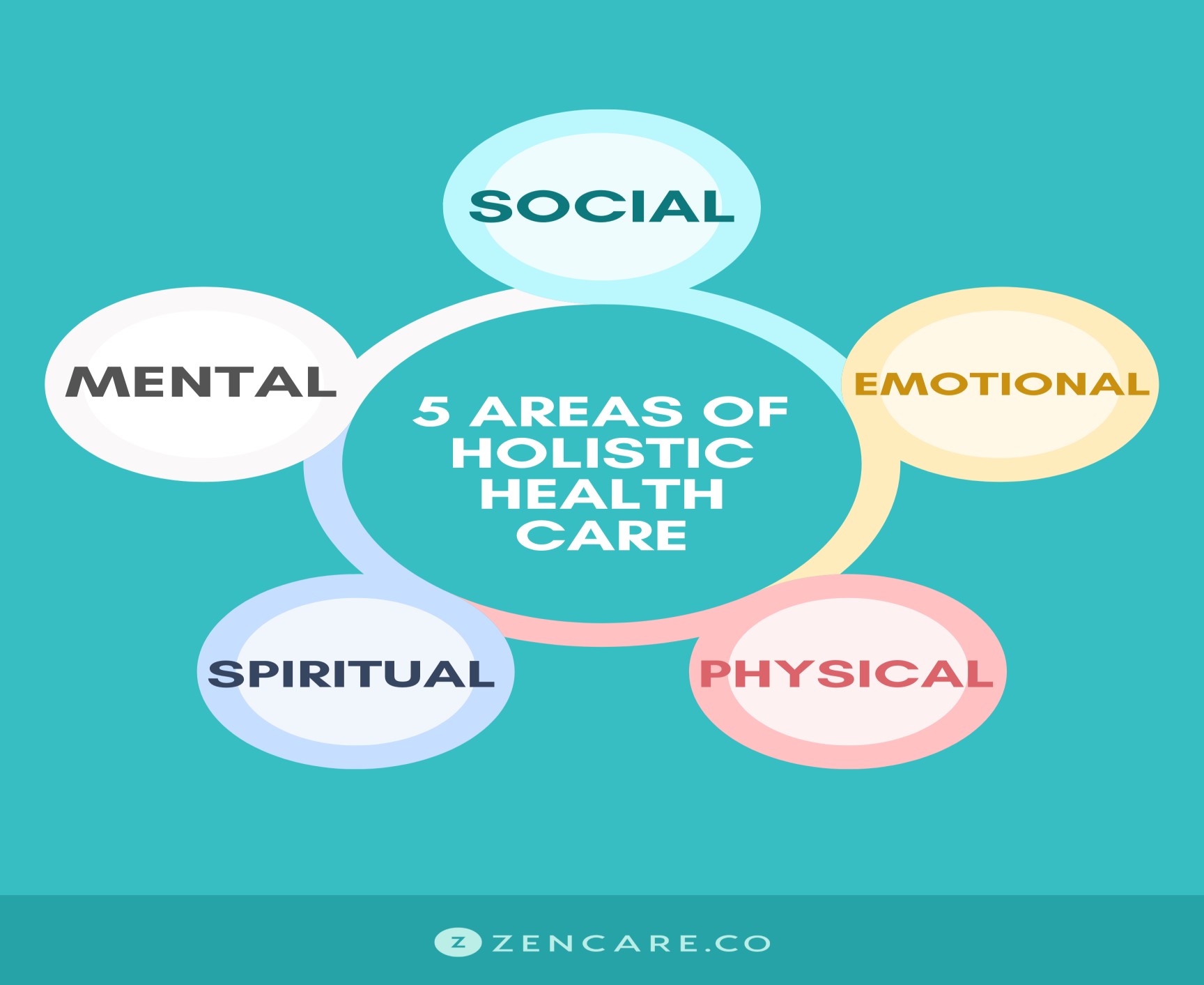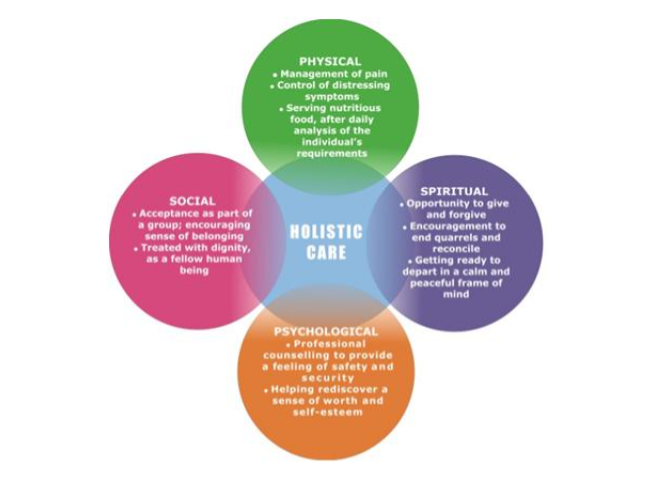What You Will Learn
After reading this note, you should be able to...
- This content is not available yet.
Holistic care is a treatment approach that considers a person's body, mind, and spirit and their interactions in the process of promoting health and well-being and treating disease.
- An approach to health care that considers the physical, emotional, social, and spiritual needs of the patient.
- Rather than merely treating illness, holistic care aims to enhance overall well-being and improve the quality of life for individuals.
- It recognizes that health is influenced by various factors, including our relationships, culture, and environment.
- Holistic care emphasizes relatedness and interconnectedness, recognizing that the whole system is greater than the sum of its parts.
- The Philosophy of HC is that it emphasizes treating the whole person, integrating mind, body, and spirit.
- The Focus is that it aims to enhance overall well-being and improve the quality of life.
- Rather than just treating symptoms, it seeks to address the root causes of health issues.
- HC uses a Comprehensive Approach in that Illness and injury are often seen as a result of disharmony in the mind-body-spirit, which are interconnected. Dysfunction in any area affects the entire person, not just a specific body part.
- HC empowers individuals to take charge of their well-being and lifestyle choices.
Synonyms
- Holistic health,
- Holistic care,
- Holism


- Comprehensive Approach: Holistic care considers the whole person, recognizing that physical health, mental well-being, emotions, and spirituality are interconnected. It goes beyond treating symptoms and aims to address underlying causes.
- Preventive Focus: Holistic care emphasizes prevention over cure. Practitioners work with patients to promote healthy lifestyles, prevent diseases, and enhance overall well-being.
- Individualization: Each person is unique, and holistic care tailors treatments to individual needs. It respects cultural differences and personal preferences.
- Mind-Body Connection: Holistic care acknowledges the influence of mental and emotional states on physical health. It encourages practices like mindfulness, stress reduction, and emotional support.
- Natural Healing: Holistic care recognizes the body's innate ability to heal itself. It integrates natural therapies, nutrition, and lifestyle modifications.
- Collaboration: Practitioners collaborate with patients, involving them in decision-making and empowering them to take an active role in their health.
- Holistic Education: Patients receive education about preventive measures, self-care, and holistic approaches. Knowledge empowers them to make informed choices.
- Compassion and Empathy: Holistic care values compassionate interactions. Practitioners listen attentively, validate feelings, and provide emotional support.
- Environmental Considerations: Holistic care acknowledges the impact of the environment on health. It promotes eco-friendly practices and awareness.
- Balance and Harmony: Holistic care seeks balance in all aspects of life—physical, emotional, social, and spiritual. It aims for overall harmony.
These values guide practitioners in providing patient-centered care that goes beyond medical diagnoses and treatments.
- Comprehensive Assessment: Rather than solely addressing medical diagnoses, holistic care takes into account the patient's complete profile. It seeks to understand the root causes of health issues rather than merely alleviating symptoms.
- Preventive Emphasis: Holistic care prioritizes prevention over treatment. Family doctors work with patients to prevent diseases and promote overall well-being.
- Nutrition and Lifestyle: Practitioners explore nutrition, detoxification, supplementation, and lifestyle factors. They consider how these elements impact health and tailor recommendations accordingly.
- Mental Health Destigmatization: Holistic care aims to destigmatize mental health. It recognizes the importance of mental and emotional well-being and encourages open discussions.
- Natural Healing Intelligence: Rather than relying solely on medical interventions, holistic care respects the body's innate healing abilities. It supports the body's natural processes.
- Cultural Sensitivity: Practitioners honor cultural differences and may incorporate traditional healing methods alongside evidence-based medicine.
- Preventative Health Education: Holistic care emphasizes educating patients about preventive health measures, empowering them to take charge of their well-being.
- Minimization of Invasive Procedures: By focusing on prevention and holistic approaches, family doctors aim to reduce the need for invasive procedures.
- Addressing Social and Economic Barriers: Holistic care sheds light on economic, social, and political factors affecting health. It considers the broader context in which patients live.
- Human-Centered Approach: Practitioners bring their humanity to healthcare, fostering compassionate and personalized interactions with patients.
Holistic Medicine, on the other hand, has been described as the art and science that addresses the whole person and integrates conventional and complementary therapies to prevent and treat disease, but most importantly to promote optimal health.
Broader term
Holistic Medicine is based on these tenets:
- Holism: It follows the philosophy of treating the whole person— mind, body, and spirit—for achieving healing.
- Integration: Holistic medicine combines various approaches, including alternative therapies, to promote overall wellness.
- Self-Healing: It recognizes the human body as a self-healing organism and focuses on supporting this inherent healing process.
- Lifestyle: Holistic medicine is not just about medical treatment; it’s also a way of life that promotes well-being.
HM encompasses a wide array of healing practices that consider the whole person—body, mind, spirit, and emotions—in the pursuit of optimal health and wellness. Here are some examples:
-
Acupuncture and Acupressure: Involves inserting thin needles into specific points on the body to stimulate energy flow and promote balance.
Acupressure involves applying pressure to these same points without using needles.
- Ayurveda: An ancient system from India, Ayurveda focuses on balancing the body's energies (doshas) through diet, herbs, and lifestyle practices.
- Homeopathy: Homeopathic remedies use highly diluted substances to stimulate the body's self-healing abilities. The principle is "like cures like," where a substance that causes symptoms in a healthy person can treat similar symptoms in an ill person.
-
Naturopathy:
- Naturopathic doctors emphasize natural remedies, nutrition, and lifestyle changes.
- They may use herbal medicine, dietary supplements, hydrotherapy, and other non-invasive therapies.
-
Traditional Chinese Medicine (TCM):
- TCM includes acupuncture, herbal medicine, cupping, and qigong.
- It aims to balance the body's vital energy (qi) and maintain harmony.
-
Mind-Body Medicine:
- Practices like meditation, mindfulness, yoga, and guided imagery promote mental and emotional well-being.
- They recognize the mind's influence on physical health.
Remember, holistic medicine treats the whole person, addresses root causes, and encourages collaboration between patient and practitioner. Whether it's massage, meditation, or nutritional counseling, these approaches contribute to a holistic view of health and healing.
- This comprehensive approach empowers practitioners to provide better care and fosters meaningful patient interactions while having a positive environmental impact.
- Addresses the Whole Person: Holistic therapy addresses the mind, body, and spirit to support health and healing¹. It involves bringing all layers and aspects of our clients into the therapy and mental health space.
- Incorporates Various Therapies: Holistic care often draws on complementary and alternative practices that the therapist may also have in their toolbox¹. It can involve drugs to relieve symptoms, but also lifestyle changes to prevent the condition from recurring.
- Enhances Quality of Life: Holistic care aims to enhance the quality of life and prevent chronic diseases. It can help with depression, anxiety, stress, trauma, and more.
- Promotes Self-Awareness: The practice of holistic therapy has increased self-awareness around overall health. It's increased the understanding that your health is more than just physical or mental, but an inclusion of all layers of self.
- Encourages Personal Responsibility: Holistic medicine is based on the belief that unconditional love and support is the most powerful healer and a person is ultimately responsible for their own health and well-being.
In summary, holistic care emphasizes the comprehensive well-being of the individual, while holistic medicine encompasses a broader system of treatment beyond conventional medicine. Both approaches recognize the interconnectedness of various aspects of health and encourage a holistic view of healing.
Practice Questions
Check how well you grasp the concepts by answering the following questions...
- This content is not available yet.
Contributors
Jane Smith
She is not a real contributor.
John Doe
He is not a real contributor.
Send your comments, corrections, explanations/clarifications and requests/suggestions